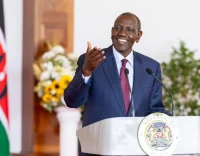Nations failing to invest in health and education are at risk of stagnating economies and lower per capita GDP, according to the first-ever scientific study ranking countries for their levels of human capital.
“Our findings show the association – between investments in education and health and improved human capital and GDP – that policymakers ignore at their own peril,” said Dr Christopher Murray, director of the Institute for Health Metrics and Evaluation (IHME) at the University of Washington. “As the world economy grows increasingly dependent on digital technology, from agriculture to manufacturing to the service industry, human capital grows increasingly important for stimulating local and national economies.”
The World Bank President Dr Jim Yong Kim defines human capital as “the sum total of a population’s health, skills, knowledge, experience, and habits.” Kim has stated that measuring and ranking countries by their human capital will enable comparisons over time, thereby providing governments and investors insights into where critical investments are needed to improve health and education. Last year, he asked IHME to develop such a measurement.
“Measuring and ranking countries by their level of human capital is critical to focus governments’ attention on investing in their own people,” Kim said. “This study from IHME is an important contribution to the measurement of human capital across countries and over time.”
The study, “Measuring human capital: A systematic analysis of 195 countries and territories, 1990–2016,” was published in the international medical journal The Lancet. It is based on a systematic analysis of an extensive array of data from numerous sources, including government agencies, schools, and health care systems.
The study places Finland at the top. Turkey showed the most dramatic increase in human capital between 1990 and 2016; Asian countries with notable improvement include China, Thailand, Singapore, and Vietnam. Within Latin America, Brazil stands out for improvement. All these countries have had faster economic growth over this period than peer countries with lower levels of human capital improvement.
In addition, the greatest increase in human capital among sub-Saharan African countries was in Equatorial Guinea. Some of the world’s most rapid improvements were in the Middle East, including Saudi Arabia and Kuwait.
Kenya’s human capital ranked 139 out of 195 countries in 2016, falling slightly from #137 in 1990. Kenya places ahead of Botswana, South Africa, Tanzania, Uganda, and Ethiopia. Gabon was the highest scoring country in sub-Saharan Africa at #118. On the health component of the study, Kenya has shown improvement since 1990. The study looks at how many years between the ages of 20 and 65 – when people are most active in the workforce – they can expect to live. On average, Kenyans lived 38 of those 45 years, while in 1990, Kenyans lived on average 35 years. But Kenya has not improved as quickly as other nations, and it is ranked only #153 in the world in terms of years workers can expect to live.
The study’s measure of functional health – which calculates the work impact of ailments like stunting, hearing and vision loss, or infectious diseases like malaria or tuberculosis – ranked Kenya at #146 in the world. Kenya scored better than Tanzania, Ethiopia, Uganda, and South Sudan, and just below South Africa.
Kenyan workers receive more education than they did in 1990. In 2016, Kenyans spent about 11 years out of a possible 18 years measured in the study. Kenya rose 16 places since 1990 in terms of years spent in school; the country ranks #111 in the world. But quality of education in Kenya is lagging. While Kenya has shown improvement since 1990 and now outranks countries like Uganda, Tanzania, Rwanda, and Ethiopia in terms of education quality, it is still only #157 in the world.
Over the past quarter century, there has been limited progress in building human capital in selected countries that started at a high baseline. The US was ranked sixth in human capital in 1990 but dropped to 27th in 2016 due in part to minimal progress in educational attainment, which dropped from 13 to 12 years during that time.
Health and education advocates, economists, and others should use the findings as evidence to argue for greater attention to – and resources for – improving their nations’ human capital.













3 Comments